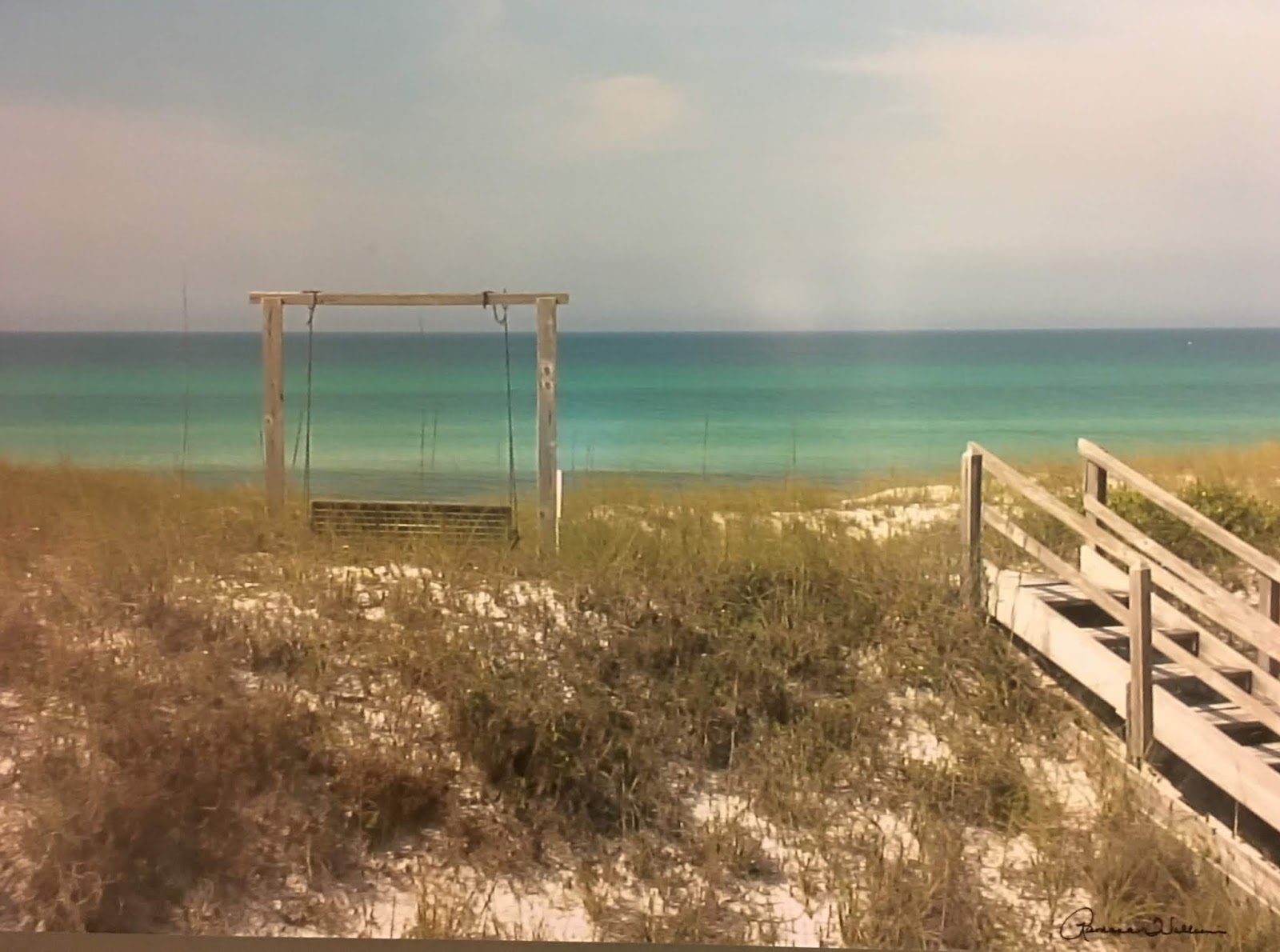Sunday Pensacola 1.0 Uncertain
Each may be different, but the corridor walls here on our 471 floor are hung with enlarged, framed photographs by Ramona Williams. Of course I don't know that she meant it so, but each one is theological and with contemplative power. The picture above is right for anyone whose life at the moment needs quietly to sit alone mindful of eternity. This seems especially right for Trinity Sunday, when we who sometimes occupy pulpits incompetently try to explain an ineffable and incomprehensible doctrine (see the Quicunque Vult, BCP page 864) to congregations of patient and forbearing souls who trust that we know more than we do.
Moving as yet by faith, we don't know a damn thing. The early fathers of the church settled orthodox Christian doctrine by ballot, certainty, raw force, faith and political power in 4th century councils, and we are subscribed to what they agreed we must believe, much of its essence, as Friedrich Schleiermacher said, beyond human knowing (e.g., read Jesus Wars by Philip Jenkins, which when I was an EfM mentor I recommended and expected all students to complete as summer reading before going on to study church history and theology, and we discussed in class at the beginning of that year), but every Sunday morning we faithfully stand and say We believe it anyway.
This morning I was on schedule to preach, but instead of standing expounding incomprehensibly from our pulpit as if I knew what I was talking about, here I am sitting in a chair at the foot of my first child and oldest daughter's ICU room bed, cherishing each uncertain moment simply because she is alive and here sharing life with me, and I am fortunate and blessed in each moment, giving thanks for each moment, learning, experiencing the very essence of uncertainty, mindful that I do not know what the next moment will bring but that I will always be grateful for having had this moment. What I contemplate this Trinity Sunday morning as I look at the wonderfully artistic photographs on the hall walls here, is that creation is more important than any doctrine and more certain, that it is Life and Love not dogma that is to be celebrated, and that king David's Psalm 90 bears greater wisdom than all the 4th century bishops combined.
Father Rohr's meditations this week have been especially meaningful to me.
RSF&PTL
T
Richard Rohr's meditation
Sunday, May 27, 2018
Vocation: Let Your Life Speak
God’s image within each of us is inherent and irrevocable. God’s likeness is our unique expression of that image, inviting our full and conscious participation. Vocation is one way in which we discover and grow into our “True Self.” I’m not speaking so much about education, career, or livelihood, though in some cases they might overlap. In general, it is a Larger Life that somehow calls us forward (vocatio means “a call or summons” in Latin), more than we call it to us. We do not know its name yet, so how can we call it? If we engineer the process too much, we often mistake a security-based occupation for our soul’s vocation.
Parker Palmer, a Quaker teacher and activist whom I deeply trust, reflects on his own “further journey”:
[There are] moments when it is clear—if I have the eyes to see—that the life I am living is not the same as the life that wants to live in me. In those moments I sometimes catch a glimpse of my true life, a life hidden like the river beneath the ice. And . . . I wonder: What am I meant to do? Who am I meant to be?
I was in my early thirties when I began, literally, to wake up to questions about my vocation. By all appearances, things were going well, but the soul does not put much stock in appearances. Seeking a path more purposeful than accumulating wealth, holding power, winning at competition, or securing a career, I had started to understand that it is indeed possible to live a life other than one’s own. . . .
Then I ran across the old Quaker saying, “Let your life speak.” I found those words encouraging, and I thought I understood what they meant: “Let the highest truths and values guide you. Live up to those demanding standards in everything you do.” . . .
So I lined up the loftiest ideals I could find and set out to achieve them. The results were rarely admirable, often laughable, and sometimes grotesque. But always they were unreal, a distortion of my true self—as must be the case when one lives from the outside in, not the inside out. I had simply found a “noble” way to live a life that was not my own, a life spent imitating heroes instead of listening to my heart.
Today, some thirty years later, “Let your life speak” means something else to me . . . : “Before you tell your life what you intend to do with it, listen to what it intends to do with you. Before you tell your life what truths and values you have decided to live up to, let your life tell you what truths you embody, what values you represent.” [1]
In other words, your life is not about you. You are about a larger thing called Life. You are not your own. You are an instance of a universal and eternal pattern. Life is living itself in you. The myriad forms of life in the universe are merely parts of the One Life—that many of us call “God.” You and I don’t have to figure it all out, fix everything, or do life perfectly by ourselves. All we have to do is participate in this One Life. To find our unique niche in that Always Larger Life is what we mean by “vocation."
